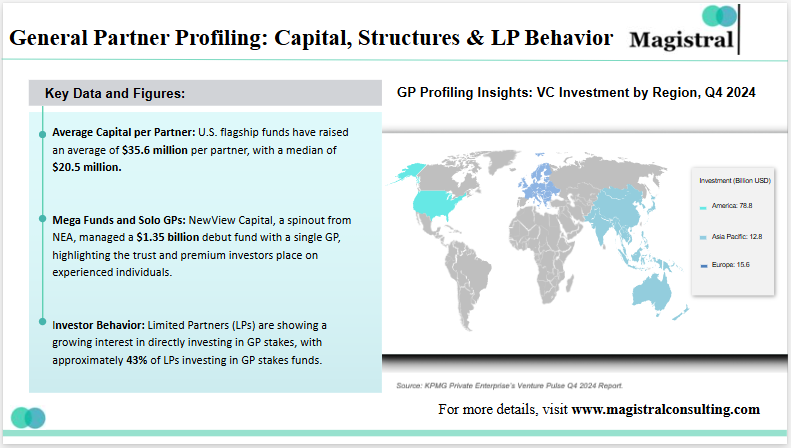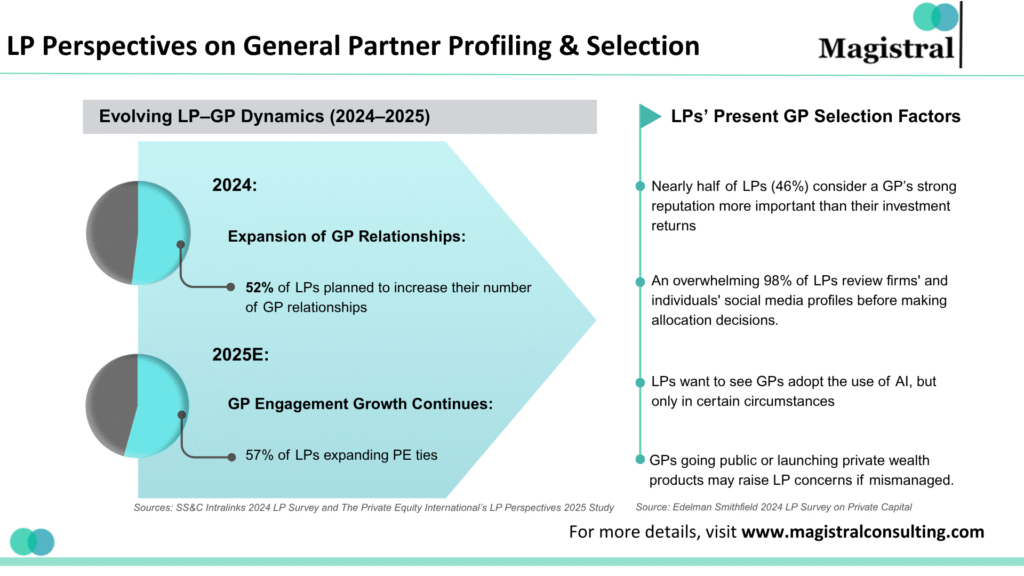General Partner (GP) profiling is no longer just a background check for limited partners (LPs). In 2025, it has come out as a sophisticated, data-driven process that validates better fund allocation, mitigates risk, and improves portfolio results. LPs today appreciates that who manages the money is as important as where the money is kept.
Rather than asking, “What’s the fund strategy?” LPs are now asking, “Who is implementing it, and do they have a remarkable track record?” General Partner profiling turns a people-centric perception into an anticipating performance lever, sharpening investment theses and enhancing fund selection.
Adaptive Role of General Partner Profiling: From Due Diligence to Strategic Intelligence
Traditionally, A component of fund due diligence primarily reputational and operational in nature considered as GP profiling. With behavioural insights included Today, it’s a cornerstone of fund evaluation, blending quantitative performance metrics.
Modern GP profiling incorporates:
Historical disaggregation of track record
Models of decision-making and dynamics of team
Interest analysis to be aligned with
Psychometric tools are used for behavioural assessment.
Deal ecosystem stakeholders for sentiment analytics
GP’s style, resilience, and consistency, allowing LPs to better match capital with conviction uses an integrated approach to uncover deeper truths.
General Partner Profiling in conception: A Private Equity Case
Evaluating three mid-market private equity funds are considered as an institutional investor. Fund A had the highest IRR in the surface. But a deeper General Partner profile revealed:
One superstar partner aid excessively to fund A’s returns
Between deal and ops teams there are internal tensions
High GP turnover in past funds
Conversely, Fund B showed stable, with moderate consistent exits across cycles and team-based performance. Over single-period outperformance that valuing sustainability where the fund B backed by LP.
With succession issues and strategy drift within three years of time, Fund B exceeded expectation, while Fund A struggled.
Post-Commitment Monitoring: Keeping GPs Accountable
Just as ESG audits track post-investment value, LPs now use GP profiling to monitor fund behaviour during the investment period.
One pension fund instituted quarterly “GP Health Checks” using a proprietary dashboard that tracked:
Key personnel retention
Adherence to stated investment themes
Co-investment behaviour
Responsiveness to LP requests
Over a 5-year horizon, this approach helped the LP renegotiate terms mid-fund with two GPs and exit early from one underperforming relationship, protecting downside while securing alpha elsewhere. This led to a better understanding of funds, towards selection and for a better investment strategy.
Product Strategy Rooted in General Partner Profiling Insights
Asset allocators are now designing fund-of-fund products based on behavioural clustering of GPs.
For instance, a sovereign wealth fund grouped GPs not by asset class but by:
Risk-taking temperament
Deal origination style (proprietary vs. competitive auctions)
Post-acquisition value creation models
The result? A balanced portfolio with reduced correlation risk and improved overall Sharpe ratio achieved not by changing asset classes, but by understanding the people behind the capital. The analysis of better fund selection characterises this capital leads for high amount of concentration to get the required ROI from it.
The General Partner Profiling Premium: What Investors are Paying For
In today’s fundraising environment, General Partners with transparent governance, strong succession plans, and aligned economics command better terms and quicker closes. Understanding and evaluating the GPs with the appropriate plan for a better investment will lead to a high ROI from it.

General Partner Profiling: Capital, Structures & LP Behavior
According to a 2024 Previn survey, GPs rated in the top quartile of “LP Trust Indices” closed funds 3 months faster and at 1.3x their target size.
Moreover, those GPs often attracted strategic co-investors willing to waive management fees in exchange for insight access, demonstrating that trust capital is fast becoming as critical as financial capital.
Four Transformational Trends in General Partner Profiling
The four transformational trends in General Partner Profiling are-
AI-Augmented Track Record Analytics-H3
Platforms now dissect historical deals not just by IRR, but by GP involvement levels, sourcing methods, and timing efficiency. AI identifies patterns even across restructured or recycled portfolios.
AI-Augmented Track Record Analytics-H3
LPs monitor how GPs are perceived by intermediaries, CEOs, and co-investors using NLP-powered tools scraping public data, earnings calls, and proprietary surveys.
AI-Augmented Track Record Analytics-H3
Through assessments and interviews, LPs evaluate decision-making under pressure, openness to dissent, and learning agility—key traits in dynamic markets.
GP-Platform Ecosystem Fit
Rather than assessing a GP in isolation, profiling now maps their fit into the LP’s broader strategy—alignment with long-term goals, values, and existing fund exposures.
Operational Excellence Through GP Alignment
A family office partnered with a niche GP targeting industrial tech roll-ups. Rather than focus solely on financials, they evaluated:
The GP’s operating cadence
Their value creation playbook
Past treatment of LPs in tough cycles
The office then offered tailored operational support shared HR resources, ESG guidance, and bolt-on scouting assistance. The synergy led to two accretive add-ons within 18 months and tripled the platform’s EBITDA.
From Profiles to Profits: The ROI of General Partner Intelligence
According to Cambridge Associates, LPs who adopt structured General Partnering profiling frameworks outperform peers by 220 basis points annually over a 10-year horizon. The alpha isn’t just in fund selection it’s in avoiding value-destructive partnerships.

LP Perspective on General Partner Profiling & Selection
General Partnering profiling adds value through:
Enhanced manager selection
Early warning signals during fund life
Better alignment in co-investments and strategic guidance
It transforms relationship management from reactive to strategic, deepening trust and improving long-term fund performance.
Case Study: Avoiding a GP Misfire
An endowment considered backing a first-time fund from an ex-bulge bracket team. While pedigree and early traction looked promising, profiling revealed:
A rigid, top-down culture unsuited for agile mid-market deals
Inflated team bios with overstated track records
Limited operational empathy
The endowment passed, instead supporting a less flashy but more grounded team. Three years on, the first fund collapsed due to founder disputes. The alternate team is now raising Fund II with a 2.5x MOIC.
GP profiling didn’t just save capital—it preserved reputational bandwidth.
Building an LP Brand Around General Partner Profiling Understanding
Leading allocators now build their brand around being “GP-friendly but disciplined.” They publish their manager selection criteria, host onboarding bootcamps, and reward transparency with better terms.
One endowment launched a “GP Playbook” outlining:
Preferred governance structures
Team dynamics they support
LP-GP communication cadences
This transparency made them a preferred LP for emerging managers, granting early access and better fee arrangements.
Internal Cohesion: General Partnering Profiling as a Cross-Functional Tool
Just like ESG, GP profiling fosters internal alignment. Investment committees, operational due diligence (ODD), legal, and even comms teams now rally around a shared GP dashboard.
This promotes:
Faster decision-making
Shared risk vocabulary
Unified LP positioning
Some firms even tie GP profiling scores to internal compensation models, aligning fund selection with institutional values.
General Partner Profiling: The Strategic Imperative
In 2025, backing a fund without understanding its GPs is like buying a startup without meeting the founder.
Whether selecting a new venture manager, considering re-ups, or optimising portfolio diversification, LPs must embed GP profiling into their core strategy. It’s not just about risk, it’s about pattern recognition, trust, and long-term alignment.
In a market of increasing volatility and choice, human capital intelligence is the new edge. The difference between alpha and regret often lies in understanding not just the numbers, but the people behind them.
Magistral services for General Partners
Magistral serves General Partners across the investment lifecycle. Right from spanning fundraising, due diligence, portfolio management, to deal sourcing. The specification of each of these areas consists of:
Fundraising Support
Targeted Investor Identification
Investor Reach out
Document Support (Pitch Decks, CIMs, and PPMs)
Real-time Reporting Dashboard Support
Deal Sourcing
Deal Sourcing
Target Profiling
Investment decision support
Due Diligence
Commercial Due Diligence
Financial Due Diligence
Operational Due Diligence
Portfolio Management
KPI Tracking and Reporting
Data Room Management
On-Demand Research
About Magistral Consulting
Magistral Consulting has helped multiple funds and companies in outsourcing operations activities. It has service offerings for Private Equity, Venture Capital, Family Offices, Investment Banks, Asset Managers, Hedge Funds, Financial Consultants, Real Estate, REITs, RE funds, Corporates, and Portfolio companies. Its functional expertise is around Deal origination, Deal Execution, Due Diligence, Financial Modelling, Portfolio Management, and Equity Research
For setting up an appointment with a Magistral representative visit www.magistralconsulting.com/contact
About the Author
The article is authored by the Marketing Department of Magistral Consulting. For any business inquiries, you can reach out to prabhash.choudhary@magistralconsulting.com